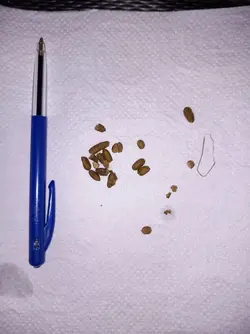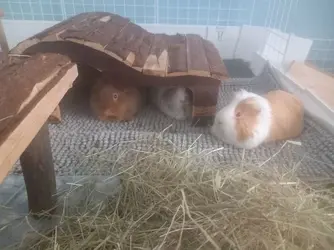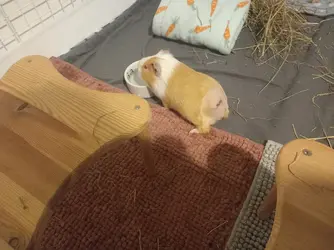Apples
Junior Guinea Pig
Hello,
My Mara is unwell unfortunately... She was diagnosed with a UTI after I noticed some squeeking when peeing. This was three weeks ago. We completed a 14-day course of antibiotics on Monday without any trouble, and took a urine sample to the vet on Tuesday which was declared perfect so I was very relieved!
Then on Wednesday Mara had soft poops, but still with some texture and she seemed happy so I assumed a late side-effect from the antibiotics. In the evening though the poops got watery and bloody and she was grunting with pain when pooping (in between the poops she was running around happily and eating hay and pellets and a tiny piece of veg to keep her hydrated and occupied while the others had their meal). I called the out of hours vet for advice and started the antibiotics and novacam up again, and called my own vet the next morning as Mara was more poorly. She was admitted to the clinic for the day and was found to have a low body temperature so they made sure she warmed up and gave her two injections to stimulate her gut. I was able to pick her up late that afternoon as she seemed on the mend and her poos were firming up again, and medicate at home with ciseral and critical care. The vet also suspected a late response of the gut to the antibiotics and that she should continue to recover.
The next morning (Friday) Mara was poorly again, and I took her to the clinic to be admitted again. She was again given two injections, an ultrasound showed no strange things in her belly, and she seemed to be getting better again, eating a little on her own, so I could pick her up in de afternoon again and continue with the ciseral and now add emeprid as well.
Unfortunately Mara deteriorated during the night again. I could only get in about 1ml syringe feed per session which lasted an hour each. I called the out of hours vet on Saturday morning for advice. Because Mara is still young (only 2 years old) and the vet is quite a drive away we discussed our options and decided to alter the medication a bit (take out the emeprid, add in novacam and antibiotics, keep syringe feeding critical care even if it is only 1 ml per session, and add some additional water because she was dehydrated). And then hope for the best and at the very least make her comfortable at home with her friends. She drifted away further and further during the day, I expected her to pass away any moment. As there were no pees the suggestion from the emergency vet that there might be kidney failure seemed to make sense.
In the evening I decided to switch back to ciseral and emeprid 3 times a day and cut out novacam and antibiotics (thinking the novacam might have made her nauseous and the antibiotics not really making sense to me). Around the same time she seemed to perk up a bit again and peed for the first time that day. I noticed her body felt warmer than during the day. During the night I was able to feed her more critical care in each session building up to 2 and 3 ml, and my last session this afternoon just now we finally managed 4 ml critical care in just half an hour. That makes 20 ml in the last 24 hours, spread out over sessions every 2-3 hours. She still isn't eating any hay or pellets on her own, but she is "present" again, aware of her surroundings. I feed her a very small piece of lettuce or cucumber about 4 times a day (think stamp-sized piece) which she will eagerly take and even come running to the fence for. She does have some infrequent but significant sized pees which are an orange colour and smell quite a bit (concentrated pees from the dehydration?). I managed to test one pee as she peed on the floor while syringe feeding: the combur strip said negative for blood.
Over these past 2 days she has been having very small poops that dried out very quickly after coming out (which isn't strange I think from eating less, being dehydrated, and her gut being slow?). Just now she had 1 normal and a few almost normal sized poop in a group of small poops (see photo).
I am so confused what is happening. I know that if she makes it through today and the night I will be calling my own piggy-savvy vet in the morning tomorrow. But I just don't know what to think: is there any hope left since she is showing small steps, or is her body giving out because it is taking too long? What is causing all of this? How long before I should start seeing her eat on her own? And to add to all the strangeness: there is no significant weight loss (she is usually between 1010 and 1030 grams on her weekly weigh-ins and has been a steady 980-990 grams since Friday evening whether I weigh her in the evening or during the day).
I've only had piggies for little under 3 years now, I am hoping some more experienced owners might be willing to share some experience? I have read a lot of the guides on here and they have helped me a great deal over the past few days, which I am very grateful for!
Also a photo of her with her friends Bonkie and Anna, and Mara on the right just as I often find them in the morning when I get up
My Mara is unwell unfortunately... She was diagnosed with a UTI after I noticed some squeeking when peeing. This was three weeks ago. We completed a 14-day course of antibiotics on Monday without any trouble, and took a urine sample to the vet on Tuesday which was declared perfect so I was very relieved!
Then on Wednesday Mara had soft poops, but still with some texture and she seemed happy so I assumed a late side-effect from the antibiotics. In the evening though the poops got watery and bloody and she was grunting with pain when pooping (in between the poops she was running around happily and eating hay and pellets and a tiny piece of veg to keep her hydrated and occupied while the others had their meal). I called the out of hours vet for advice and started the antibiotics and novacam up again, and called my own vet the next morning as Mara was more poorly. She was admitted to the clinic for the day and was found to have a low body temperature so they made sure she warmed up and gave her two injections to stimulate her gut. I was able to pick her up late that afternoon as she seemed on the mend and her poos were firming up again, and medicate at home with ciseral and critical care. The vet also suspected a late response of the gut to the antibiotics and that she should continue to recover.
The next morning (Friday) Mara was poorly again, and I took her to the clinic to be admitted again. She was again given two injections, an ultrasound showed no strange things in her belly, and she seemed to be getting better again, eating a little on her own, so I could pick her up in de afternoon again and continue with the ciseral and now add emeprid as well.
Unfortunately Mara deteriorated during the night again. I could only get in about 1ml syringe feed per session which lasted an hour each. I called the out of hours vet on Saturday morning for advice. Because Mara is still young (only 2 years old) and the vet is quite a drive away we discussed our options and decided to alter the medication a bit (take out the emeprid, add in novacam and antibiotics, keep syringe feeding critical care even if it is only 1 ml per session, and add some additional water because she was dehydrated). And then hope for the best and at the very least make her comfortable at home with her friends. She drifted away further and further during the day, I expected her to pass away any moment. As there were no pees the suggestion from the emergency vet that there might be kidney failure seemed to make sense.
In the evening I decided to switch back to ciseral and emeprid 3 times a day and cut out novacam and antibiotics (thinking the novacam might have made her nauseous and the antibiotics not really making sense to me). Around the same time she seemed to perk up a bit again and peed for the first time that day. I noticed her body felt warmer than during the day. During the night I was able to feed her more critical care in each session building up to 2 and 3 ml, and my last session this afternoon just now we finally managed 4 ml critical care in just half an hour. That makes 20 ml in the last 24 hours, spread out over sessions every 2-3 hours. She still isn't eating any hay or pellets on her own, but she is "present" again, aware of her surroundings. I feed her a very small piece of lettuce or cucumber about 4 times a day (think stamp-sized piece) which she will eagerly take and even come running to the fence for. She does have some infrequent but significant sized pees which are an orange colour and smell quite a bit (concentrated pees from the dehydration?). I managed to test one pee as she peed on the floor while syringe feeding: the combur strip said negative for blood.
Over these past 2 days she has been having very small poops that dried out very quickly after coming out (which isn't strange I think from eating less, being dehydrated, and her gut being slow?). Just now she had 1 normal and a few almost normal sized poop in a group of small poops (see photo).
I am so confused what is happening. I know that if she makes it through today and the night I will be calling my own piggy-savvy vet in the morning tomorrow. But I just don't know what to think: is there any hope left since she is showing small steps, or is her body giving out because it is taking too long? What is causing all of this? How long before I should start seeing her eat on her own? And to add to all the strangeness: there is no significant weight loss (she is usually between 1010 and 1030 grams on her weekly weigh-ins and has been a steady 980-990 grams since Friday evening whether I weigh her in the evening or during the day).
I've only had piggies for little under 3 years now, I am hoping some more experienced owners might be willing to share some experience? I have read a lot of the guides on here and they have helped me a great deal over the past few days, which I am very grateful for!
Also a photo of her with her friends Bonkie and Anna, and Mara on the right just as I often find them in the morning when I get up



